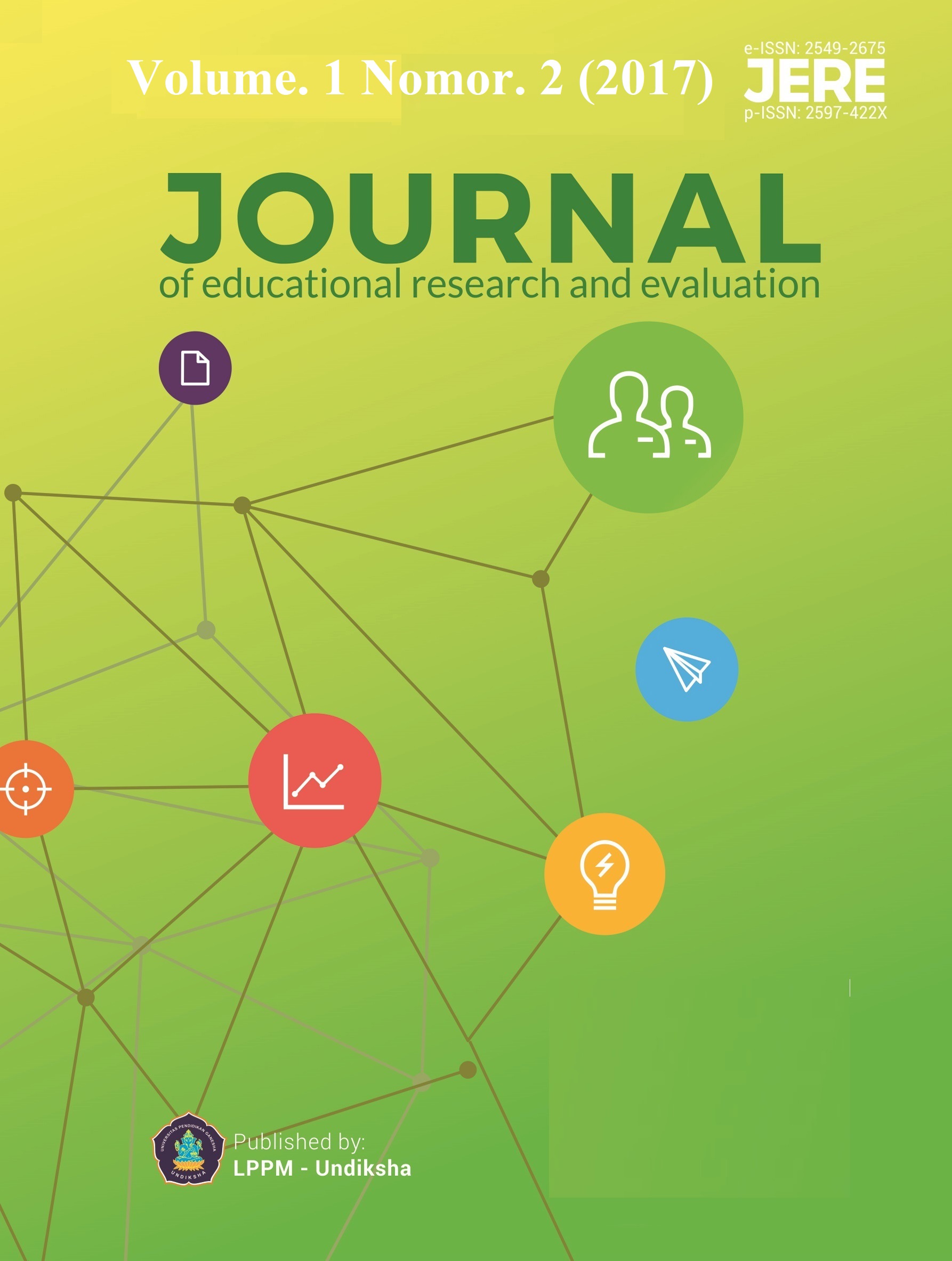The Discrepancy of Curriculum 2013 in Teaching and Learning Process Based on Permendikbud No 65 of 2013 in SD Laboratorium Undiksha
DOI:
https://doi.org/10.23887/jere.v1i2.9840Abstract
This research aimed to determine how large the discrepancy between the ideal condition and the implementation of 2013 curriculum in teaching and learning process at SD Laboratorium Undiksha reviewed from the lesson plan, teaching learning process, assessment and learning outcomes, and the monitoring of learning process. This study was evaluative research which apply discrepancy model. Measurement of the program effectiveness was done by comparing the ideal conditions, based on Permendikbud No. 65 of 2013, with the real conditions on the implementation of 2013 Curriculum at SD Laboratorium Undiksha. Lesson plan, assessment process, and learning outcomes variable, were measured by the study documentation sheets. Meanwhile, the teaching and learning process variable was measured by observation sheets, and the monitoring of learning process variable was measured by questionnaire. Sample of the study consisted of 4 teachers of SD Laboratorium Undiksha. The scores form for all variables were analyzed using the Wilcoxon’s signed rank test. The sign difference and score difference were calculated with a predetermined standard. The result of the analysis showed that the large of discrepancy between ideal conditions (based on Permendikbud No. 65 of 2013) and the implementation of 2013 Curriculum at SD Laboratorium Undiksha in terms of lesson plan is 17,90%, teaching and learning process is 12,11%, assessment and learning outcomes is 6,67%, and the monitoring of learning process is 10,95%. The discrepancy is generally due to the difficulty in changing the mindset of most education staff, tardiness of the books’ distribution, and uneven training programs for educators.
References
Agung, A. A. Gede. 2014. “Arah Penelitian Pendidikan Dasar (Ke-SD-an) Berorientasi Kurikulum 2013”. Makalah disajikan dalam Seminar Akademik Jurusan PGSD. Universitas Pendidikan Ganesha, Singaraja Oktober 2014.
Arikunto, Suharsimi dan Cepi Safrudin Abdul Jabar. 2008. Evaluasi Program Pendidikan. Jakarta: Bumi Aksara.
Bhakti AS, Sentot Kusairi & Muhardjito. 2014. Pengembangan Model Penilaian Autentik Berbasis Kurikulum 2013. Hlm 1 -12.
Chamisijatin, Lise. 2008. Pengembangan Kurikulum SD. Jakarta: Departemen Pendidikan Tinggi
Hamalik, Oemar. 2002. Perencanaan Pengajaran Berdasarkan Pendekatan Sistem. Jakarta: Bumi Aksara.
Kemendikbud Kementrian Guru dan Kebudayaan 2012. Kurikulum 2013. Jakarta: Kementerian Guru dan Kebudayaan.
Kurniasih, Imas dan Berlin Sani. 2014. Sukses Mengimplementasikan Kurikulum 2013. Jakarta: Kata Pena
Nasution, S. 2012. Metode Researsh. Jakarta: Bumi Aksara .
Permendikbud Nomor 65 Tahun 2013 tentang Standar Proses Pendidikan Dasar dan Menengah.
Prasetyo, Zuhdan K. 2014. “Generasi Emas 2045 sebagai Fondasi Mewujudkan Siklus Peradaban Bangsa Melalui Implementasi Kurikulum 2013 di Sekolah Dasar”. Makalah disajikan dalam Seminar Nasional Kurikulum 2013. Universitas Tanjungpura, Pontianak 16 April 2014.
Sariono. 2013. Kurikulum 2013: kurikulum generasi emas. E-Jurnal Dinas Guru Kota Surabaya, 3:1-8.
Suciptawati, Ni Luh Putu. 2009. Metode Statistika Nonparametrik. Denpasar: Udayana University Press.
Sugiyono. 2013. Metode Penelitian Pendidikan. Bandung: Alfa Beta
Undang-Undang Nomor 20 Tahun 2003 tentang Sistem Pendidikan Nasional
Undang-Undang Nomor 32 Tahun 2013 tentang Standar Nasional Pendidikan
Downloads
Published
How to Cite
Issue
Section
License
Authors who publish with the Journal of Evaluation and Research in Education (JERE) agree to the following terms:
- Authors retain copyright and grant the journal the right of first publication with the work simultaneously licensed under a Creative Commons Attribution License (CC BY-SA 4.0) that allows others to share the work with an acknowledgment of the work's authorship and initial publication in this journal.
- Authors are able to enter into separate, additional contractual arrangements for the non-exclusive distribution of the journal's published version of the work (e.g., post it to an institutional repository or publish it in a book), with an acknowledgment of its initial publication in this journal.
- Authors are permitted and encouraged to post their work online (e.g., in institutional repositories or on their website) prior to and during the submission process, as it can lead to productive exchanges, as well as earlier and greater citation of published work. (See The Effect of Open Access)











